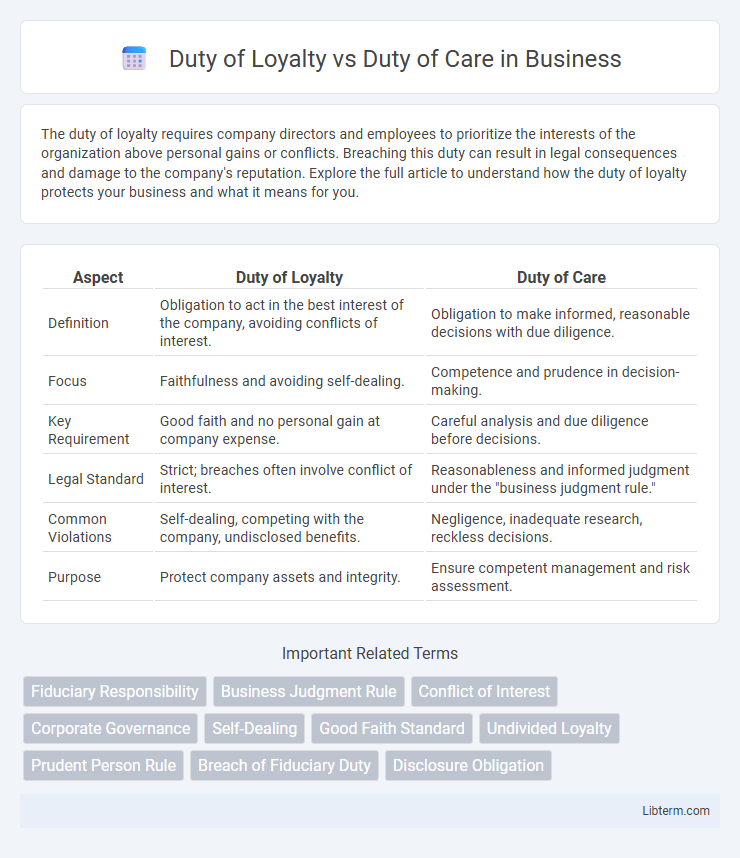The duty of loyalty requires company directors and employees to prioritize the interests of the organization above personal gains or conflicts. Breaching this duty can result in legal consequences and damage to the company's reputation. Explore the full article to understand how the duty of loyalty protects your business and what it means for you.
Table of Comparison
| Aspect | Duty of Loyalty | Duty of Care |
|---|---|---|
| Definition | Obligation to act in the best interest of the company, avoiding conflicts of interest. | Obligation to make informed, reasonable decisions with due diligence. |
| Focus | Faithfulness and avoiding self-dealing. | Competence and prudence in decision-making. |
| Key Requirement | Good faith and no personal gain at company expense. | Careful analysis and due diligence before decisions. |
| Legal Standard | Strict; breaches often involve conflict of interest. | Reasonableness and informed judgment under the "business judgment rule." |
| Common Violations | Self-dealing, competing with the company, undisclosed benefits. | Negligence, inadequate research, reckless decisions. |
| Purpose | Protect company assets and integrity. | Ensure competent management and risk assessment. |
Introduction to Fiduciary Duties
Fiduciary duties require directors and officers to act in the best interest of the corporation, encompassing two primary responsibilities: the Duty of Loyalty and the Duty of Care. The Duty of Loyalty mandates avoidance of conflicts of interest, ensuring decisions benefit the corporation rather than personal interests. The Duty of Care emphasizes making informed and prudent decisions by exercising reasonable diligence and judgment in corporate governance.
Defining Duty of Loyalty
The Duty of Loyalty requires corporate directors and officers to prioritize the interests of the corporation above their own personal gains, avoiding conflicts of interest and self-dealing. This fiduciary duty mandates acting in good faith and with undivided allegiance to protect the company's assets and reputation. Unlike the Duty of Care, which emphasizes informed and prudent decision-making, the Duty of Loyalty centers on maintaining honesty and fidelity in all corporate matters.
Understanding Duty of Care
Duty of care requires corporate directors to act with the prudence and diligence that a reasonably careful person would use in similar circumstances, ensuring informed and attentive decision-making. This legal obligation emphasizes thorough investigation, critical analysis, and reliance on adequate information before making business judgments. Understanding duty of care is essential to safeguard the corporation's interests and minimize liability risks associated with negligence or inattentiveness.
Key Differences: Duty of Loyalty vs Duty of Care
The Duty of Loyalty requires directors to act in the best interest of the corporation, avoiding conflicts of interest and self-dealing, whereas the Duty of Care mandates directors to make informed and prudent decisions with the diligence of a reasonable person. Duty of Loyalty centers on allegiance and avoidance of personal gain at the corporation's expense, while Duty of Care emphasizes thorough investigation, due diligence, and reasonable decision-making processes. Breaches of Duty of Loyalty typically involve fraud or self-dealing, whereas breaches of Duty of Care involve negligence or failure to exercise adequate oversight.
Real-world Examples of Breaches
Breach of the Duty of Loyalty often involves conflicts of interest, such as a corporate officer diverting a business opportunity for personal gain, illustrated by the landmark case Guth v. Loft Inc. Breaches of the Duty of Care typically occur when directors fail to make informed decisions, as seen in the Smith v. Van Gorkom case, where inadequate due diligence led to liability. Real-world examples highlight the distinction: Loyalty breaches center on self-dealing and personal interests, while Care breaches focus on negligence and lack of proper oversight.
Legal Consequences of Violation
Violations of the Duty of Loyalty often lead to severe legal consequences such as disgorgement of profits, injunctions, and potential personal liability for breaches involving self-dealing or conflicts of interest. Breaches of the Duty of Care typically result in claims of negligence, leading to damages for losses due to inadequate oversight or failure to act with reasonable diligence. Courts analyze fiduciaries' adherence to these duties under standards like the business judgment rule, which may shield directors unless gross negligence or bad faith is proven.
Importance in Corporate Governance
Duty of Loyalty requires corporate directors to prioritize the company's interests above their own, preventing conflicts of interest and ensuring ethical decision-making. Duty of Care mandates directors to make informed, diligent decisions based on thorough analysis, minimizing risks to the organization. Both duties are fundamental to maintaining trust, accountability, and effective oversight in corporate governance frameworks.
How to Uphold Each Duty
Upholding the duty of loyalty requires directors to avoid conflicts of interest, prioritize the corporation's best interests, and fully disclose any personal benefits related to corporate decisions. Ensuring the duty of care involves diligent decision-making, thorough investigation of relevant information, and regular monitoring of the company's operations to make informed, prudent business judgments. Both duties mandate a proactive commitment to ethical standards and transparency to protect shareholders and sustain corporate integrity.
Recent Case Law Highlights
Recent case law highlights the duty of loyalty as requiring directors to avoid conflicts of interest and prioritize the corporation's interests above personal gains, emphasized in cases like *In re Oracle Corp. Derivative Litigation* (2023). Courts have reinforced the duty of care by demanding directors exercise informed judgment with due diligence, exemplified by the *Smith v. XYZ Corp.* ruling (2024), which clarified standards for decision-making processes and reliance on expert advice. These decisions collectively stress rigorous adherence to fiduciary responsibilities, balancing ethical business conduct with prudent oversight to protect shareholder value.
Best Practices for Boards and Executives
Boards and executives must prioritize the Duty of Loyalty by avoiding conflicts of interest and ensuring decisions serve the organization's best interests, fostering transparency and trust. The Duty of Care requires thorough, informed decision-making supported by diligent risk assessment and regular performance reviews to uphold fiduciary responsibilities. Best practices include implementing robust governance policies, continuous training on ethical standards, and maintaining open communication channels to reinforce accountability and sound stewardship.
Duty of Loyalty Infographic

 libterm.com
libterm.com